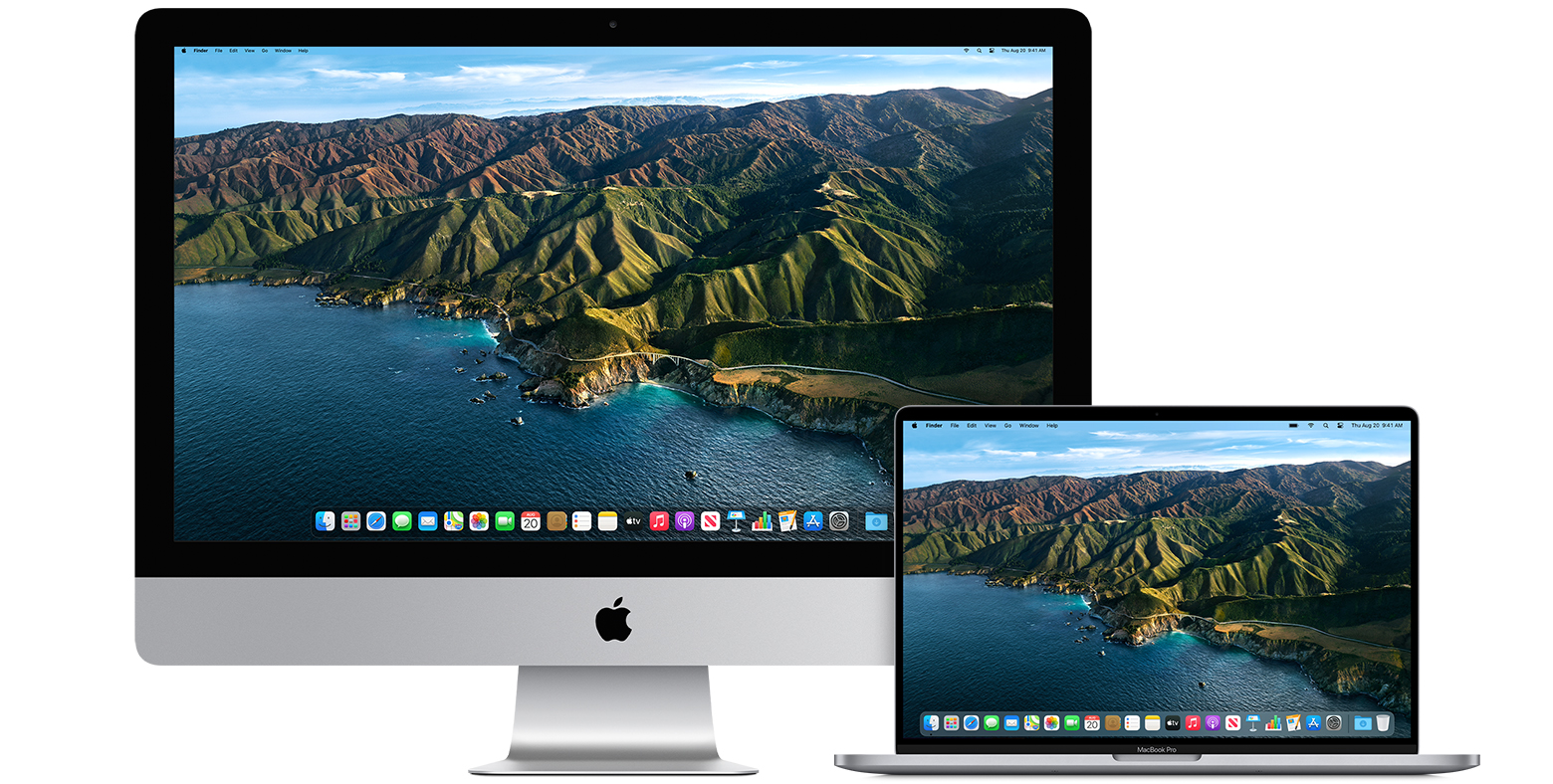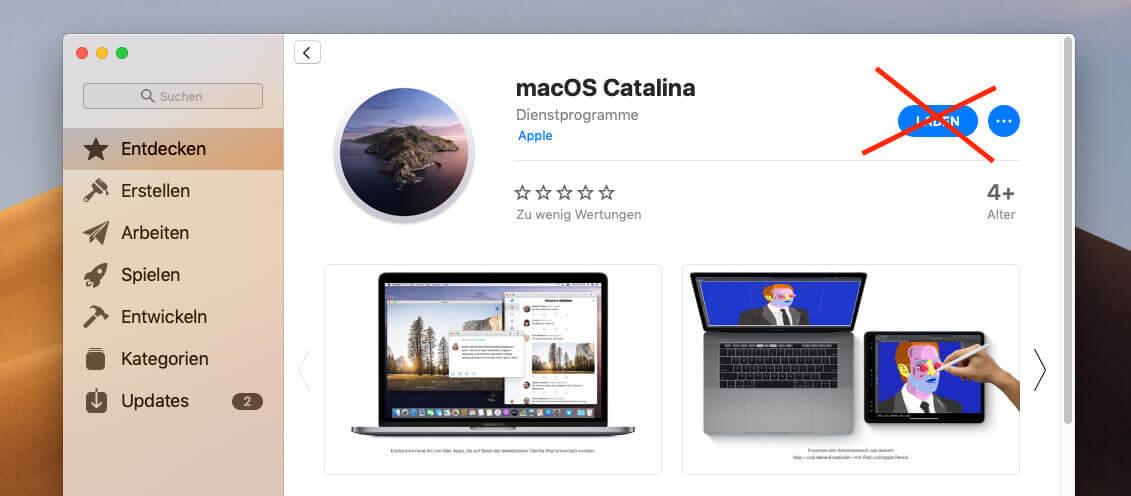These advanced steps are primarily for system administrators and others who are familiar with the command line. You don't need a bootable installer to upgrade macOS or reinstall macOS, but it can be useful when you want to install on multiple computers without downloading the installer each time.
- If you are running macOS Sierra or earlier, choose Mac OS Extended – Catalina will convert it to APFS automatically during the installation process. In the Size: field, enter the size in.
- Install macOS 10.15 Catalina. After downloading macOS 10.15 Catalina, the installer will begin on its own and launch automatically. Follow the on-screen instructions to complete the upgrade and start using macOS Catalina. When prompted, select the internal hard drive to upgrade the Mac or an external hard drive to create an external macOS drive.
- Also, the new OS, Catalina, features Apple Arcade, improved security, and privacy, better accessibility for the disabled, more applications, Find My Mac feature, and many more. However, one problem users tend to face often with new Operating System releases is how to download and install them.
NOTE: The macOS Catalina Installer File must be present in your application folder to proceed with this tutorial. Step 2: Create macOS Catalina Bootable Installer. To create a macOS Catalina Bootable Installer file, we will be using Terminal from the Applications with the help of a macOS Catalina Installer File.
What you need to create a bootable installer
- A USB flash drive or other secondary volume formatted as Mac OS Extended, with at least 14GB of available storage
- A downloaded installer for macOS Big Sur, Catalina, Mojave, High Sierra, or El Capitan
Download macOS
- Download: macOS Big Sur, macOS Catalina, macOS Mojave, or macOS High Sierra
These download to your Applications folder as an app named Install macOS [version name]. If the installer opens after downloading, quit it without continuing installation. To get the correct installer, download from a Mac that is using macOS Sierra 10.12.5 or later, or El Capitan 10.11.6. Enterprise administrators, please download from Apple, not a locally hosted software-update server. - Download: OS X El Capitan
This downloads as a disk image named InstallMacOSX.dmg. On a Mac that is compatible with El Capitan, open the disk image and run the installer within, named InstallMacOSX.pkg. It installs an app named Install OS X El Capitan into your Applications folder. You will create the bootable installer from this app, not from the disk image or .pkg installer.
Use the 'createinstallmedia' command in Terminal
- Connect the USB flash drive or other volume that you're using for the bootable installer.
- Open Terminal, which is in the Utilities folder of your Applications folder.
- Type or paste one of the following commands in Terminal. These assume that the installer is in your Applications folder, and MyVolume is the name of the USB flash drive or other volume you're using. If it has a different name, replace
MyVolumein these commands with the name of your volume.

Big Sur:*
Catalina:*
Mojave:*
High Sierra:*
El Capitan:
* If your Mac is using macOS Sierra or earlier, include the --applicationpath argument and installer path, similar to the way this is done in the command for El Capitan.
After typing the command:
- Press Return to enter the command.
- When prompted, type your administrator password and press Return again. Terminal doesn't show any characters as you type your password.
- When prompted, type
Yto confirm that you want to erase the volume, then press Return. Terminal shows the progress as the volume is erased. - After the volume is erased, you may see an alert that Terminal would like to access files on a removable volume. Click OK to allow the copy to proceed.
- When Terminal says that it's done, the volume will have the same name as the installer you downloaded, such as Install macOS Big Sur. You can now quit Terminal and eject the volume.
Use the bootable installer
Determine whether you're using a Mac with Apple silicon, then follow the appropriate steps:
Apple silicon
- Plug the bootable installer into a Mac that is connected to the internet and compatible with the version of macOS you're installing.
- Turn on your Mac and continue to hold the power button until you see the startup options window, which shows your bootable volumes.
- Select the volume containing the bootable installer, then click Continue.
- When the macOS installer opens, follow the onscreen instructions.
Intel processor
- Plug the bootable installer into a Mac that is connected to the internet and compatible with the version of macOS you're installing.
- Press and hold the Option (Alt) ⌥ key immediately after turning on or restarting your Mac.
- Release the Option key when you see a dark screen showing your bootable volumes.
- Select the volume containing the bootable installer. Then click the up arrow or press Return.
If you can't start up from the bootable installer, make sure that the External Boot setting in Startup Security Utility is set to allow booting from external media. - Choose your language, if prompted.
- Select Install macOS (or Install OS X) from the Utilities window, then click Continue and follow the onscreen instructions.
Os Catalina Installation Problems
Learn more
A bootable installer doesn't download macOS from the internet, but it does require an internet connection to get firmware and other information specific to the Mac model.
For information about the createinstallmedia command and the arguments you can use with it, make sure that the macOS installer is in your Applications folder, then enter the appropriate path in Terminal:
In the guide, we will learn How to Create macOS Catalina Bootable Installer for Clean Installation. With macOS Catalina Bootable Installer you can simply use it to install macOS Catalina on your MAC. The steps are pretty easy, so you can simply sit back and relax and read this guide on How to Create macOS Catalina Bootable Installer for Clean Installation.
For Windows PC, you can use this guide- How To Create macOS Catalina Bootable USB on Windows: 4 Easy Steps (+Video Tutorial)
Who can upgrade?

- MacBook (early 2015 or newer);
- MacBook Air (mid-2012 or newer);
- MacBook Pro (mid-2012 or newer);
- Mac mini (late 2012 or newer);
- iMac (late 2012 or newer);
- iMac Pro (2017 or newer);
- Mac Pro (late 2013 or newer).
As you can see, the update is very democratic. Even the old computers seven years ago got a new version of macOS.
How to Create macOS Catalina Bootable Installer for Clean Installation: Things Required
- A USB Drive or an external drive with a minimum of 16GB free space.
- macOS Catalina Installer File. (Links provided below)
Easy steps to Create macOS Catalina Bootable Installer
Mac Os Catalina Installer Damaged
Step 1: Download the latest version of the macOS Catalina Installer File.
You can get the latest version of macOS Catalina from the Apple App Store.

Or, you can download it from the links provided below.
Mac Os Catalina Installer
After the download is complete, do not proceed to install the macOS. Instead, close the installer and go to your application and look out for the installer file.
NOTE: The macOS Catalina Installer File must be present in your application folder to proceed with this tutorial.
Step 2: Create macOS Catalina Bootable Installer
To create a macOS Catalina Bootable Installer file, we will be using Terminal from the Applications with the help of a macOS Catalina Installer File.
Now, insert your USB drive or the external drive into the USB port. Before proceeding with the installation, we need to format the USB drive. Now, open the Disk Utility and click on your pen drive and click Erase.
Title: USBFlashDrive
Format: Mac OS X Extended (Journaled).
Scheme: GUID Partition Map.
Once the USB disk has been erased, close the disk Utility and open the Terminal from Applications or Launchpad.

Type the following command.

Note: USBFlashDrive at the end of the comment is the name of the USD drive that you have kept.
Enter your password and wait for the process to finish.
If you are using a Windows PC, you can use this guide- How To Create macOS Catalina Bootable USB on Windows: 4 Easy Steps (+Video Tutorial)
How to Install macOS Catalina from Bootable Installer
- Insert the Bootable Installer to your MAC.
- Restart your Mac.
- Power to the Mac and hold on to the Options button on the keyboard.
- Select the macOS Catalina alternative from the drop-down menu.
- Then, the utility window will be opened, you have to pick the disk drive utility. You need to erase the drive that you would like to install macOS Catalina into.
- Once you’ve finished then click on the Install button and then wait for the setup to complete.
How to Create macOS Catalina Bootable Installer for Clean Installation: Final Words
It was all about How to Create macOS Catalina Bootable Installer for Clean Installation. You can also make a bootable installer for macOS Catalina on Windows, but it needs a lot of time. Here is the guide that you can use- How To Create macOS Catalina Bootable USB on Windows: 4 Easy Steps (+Video Tutorial). In Mac, it has some easy actions to be carried out. If you face any problems, don’t be afraid to leave comments in the comment section below. Here are some Common macOS Catalina Problems and Solutions: 11 Key Errors and their Fix
You can also read: How to Speed Up macOS Catalina? 7 Easy Methods